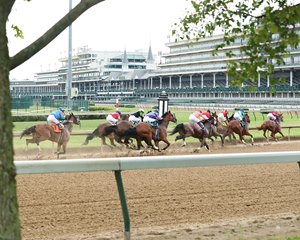Judge Reviews Tracks' Rights to Impose Non-Lasix Rules


Whether Churchill Downs and Keeneland have the authority to prohibit race-day use of the anti-bleeding medication furosemide in 2-year-olds was debated May 27 during a court hearing as part of a lawsuit filed against the two tracks by the Kentucky Horsemen's Benevolent and Protective Association.
Wednesday's hearing before Franklin Circuit Judge Thomas Wingate was in response to a motion filed by the Kentucky HBPA seeking a temporary injunction against the rules taking effect. Three races for 2-year-olds have been run during the current Churchill meet and Keeneland has been approved by the Kentucky Horse Racing Commission's dates committee for an abbreviated summer meet from July 8-12 after canceling its spring meet due to the COVID-19 pandemic.
Following the 40-minute hearing conducted via teleconference due to coronavirus restrictions, Wingate said he would issue a ruling promptly on the request for an injunction, "within four or five days," or possibly sooner considering that Churchill is conducting Lasix-free races for 2-year-olds.
The KHRC, which is also a defendant in the legal action, approved medication regulation changes late last year that included a phase out of furosemide—also marketed under the trade names Lasix or Salix—stipulating the drug could not be administered within 24 hours of a race for 2-year-olds starting this year. As part of the proposed regulations, race-day Lasix would be prohibited in stakes races beginning in 2021, but since they haven't gone into effect yet those regulations were not a focus of the current litigation.
Much of Wednesday's hearing focused on 2015 regulations enacted by the KHRC permitting the tracks to decide whether to allow the administration of furosemide on race days or for particular races. Then Kentucky Attorney General Jack Conway issued an opinion that the regulation allowing tracks to ban the use of furosemide "was an invalid and illegal delegation of the KHRC's authority to private actors."
That regulation amounted to a sub-delegation of regulatory authority to the tracks, said David Faughn, representing the Kentucky HBPA.
"We are not challenging, nor do we dispute, there are certain conditions they are allowed to set in their condition book," Faughn said of racetracks. "The question is whether they can set medication issues. The General Assembly has delegated to them (KHRC) the power to enact medication rules. They do not then have the power to sub-delegate those rules to another body inside the government or outside the government with certain notable exceptions that do not apply here.
"There are a lot of people who have different views on this, and in good faith," Faughn said. "We are not questioning the good faith of people who want to argue that Lasix should be banned entirely or banned in certain races. Those are opinions to be given to the Kentucky Horse Racing Commission and solely for them to decide whether those medications will be allowed or won't be allowed. The attorney general has said this regulation is an invalid sub-delegation of the statute and the Kentucky Horse Racing Commission simply doesn't have that power."
Jennifer Wolsing, representing the KHRC, said Conway's opinion on the 2015 statute did not have the force of law and was just that—an opinion.
"I would suggest the main thing about an attorney general's opinion is that isn't the law," she said. "It provides guidance in the absence of a court ruling and placed before the court the opinion should not be given (merit) beyond the strength of its reason. It is our position this regulation does not delegate any authority. The racing commission adopted the rule, not the racetracks."
Wolsing and attorneys for Churchill Downs and Keeneland said the Kentucky HBPA failed to show that any owner or trainer would be irreparably harmed by the continuation of Lasix-free racing in 2-year-olds, sufficient to the extent that Wingate should grant the request for an injunction. The Kentucky HBPA had submitted affidavits to the court from two members the day before the hearing.
"We do not believe the substantial question has been presented and we do not believe that the HBPA has shown evidence of any sort of irreparable harm," Wolsing said. "Neither affidavit shows whether an individual would suffer any sort of harm by this regulation. There is no identified member who would suffer any harm if this regulation is allowed to stand."
Don Kelly, representing Churchill Downs, explained that Kentucky tracks had indicated a year ago of their intention to phase out race-day Lasix, beginning with 2-year-olds this year.
"They knew a year in advance what the conditions would be going forward," Kelly said. "There's not a single owner or trainer who has joined this lawsuit. There's not a single horse that has been harmed. I don't think they (plaintiffs) can show irreparable harm or a delegation of power to the tracks."
Faughn countered that under the no-Lasix conditions, owners and trainers would lose the ability race some 2-year-olds that are bleeders and benefit from the use of furosemide.
"We'll have something for you fairly quickly," Wingate said of the timing of his ruling on the request for an injunction.
